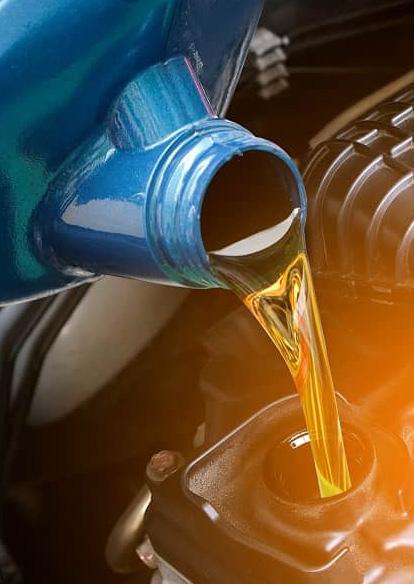
7 minute read
Improve fuel economy with the right Engine Oil Additives
By Dorcas Kang'ereha
Your engine has the heaviest workload in your vehicle, so you need to keep it lubricated and protected. That's why a lot of effort goes into making motor oils with all the right additives to protect your engine, keep it running smoothly and help extend its life. These additives are designed to meet a range of specific applications, such as gasoline and diesel engines, and they can help improve fuel economy, extend the life of your engine and more.
Advertisement
The additive package typically accounts for 15% to 25% of the total volume of the oil. The remaining percentage is base oil. Typical oil additives include detergents, corrosion inhibitors, metal deactivators, anti-wear agents and antioxidants that slow the rate of oxidation in the engine to prevent rust and corrosion. They are used in various amounts depending on the vehicle and engine requirements. They can be applied to the cylinder walls, piston rings and lifters to reduce wear.
Oil additives work by enhancing the lubrication, viscosity and performance of the oil. They are added to the motor oil at the manufacturer's request. They can make the oil flow better and more effectively by increasing its thickness. The thickness of the oil is important because it allows it to coat all the moving parts in the engine and prevents friction between them. If the oil has poor lubrication, the engine may run rough or idle. This is often a sign of sludge build-up, and adding an oil additive can remove this problem. Additives are also added to increase the oil's ability to flow, which helps protect engine components and keeps them clean. This can be helpful especially for older vehicles and those with high mileage.
The best engine oil for older vehicles contains anti-wear additives and corrosion inhibitors that slow the rate of oxidation in the engine to prevent rust and corrosion. This also helps keep your engine clean to reduce wear from deposits in your oil, allowing your engine to run more efficiently and reliably.

Types of oil additives
Anti-wear additives: They are used to provide a layer of protection to metal engine parts, such as cam lobes, lifter bodies and lifter bores. They include zinc diakyldithiophosphate (ZDDP), phosphorus compounds, and molybdenum, which help to decrease friction between parts.
ZDDP: Zinc diakyl-dithiophosphate is an important component of many anti-wear additives because it provides lubrication to the parts that need it. However, it can shorten the life of your catalytic converter when it is present in exhaust gas.
Viscosity modifiers: Your engine oil needs a certain viscosity to flow properly and transfer heat effectively between key components. If the viscosity of your oil is too thick for normal operation, it can fail to fill the gap between crank journals and main bearings, causing bearing wear, and impair circulation in your engine. This can lead to poor fuel economy, as the oil can't transfer heat to critical components, and it may even increase internal friction.
Viscosity modifiers: Also called viscosity index improvers (VIIs), are an essential engine oil additive because they stabilize the viscosity of your oil to ensure it flows
properly at all temperatures, from cold to hot. Almost all modern engine oils contain VIIs, so it's important to choose a quality motor oil that includes this additive.

James Mutisya
Detergents: Most high-quality motor oils today come with a detergent to remove water, dirt and other particles from your oil. Those detergents are also effective at removing sludge, helping to maintain a clean engine and prolong its service life.
Anti-oxidants: Most high-quality motor oils are loaded with antioxidants to help prevent rust and corrosion by neutralizing acids in your oil and preventing the chemical breakdown that leads to corrosive effects on your engine. Antioxidants also help to increase the performance of your engine by protecting it from damaging acidic emissions and reducing harmful particulates that cause engine damage.
Corrosion Inhibitors: Typically made with barium sulfonate and calcium, corrosion and rust inhibitors are designed to protect metal engine parts from the damaging effects of moisture. They also help to prevent a buildup of contaminants and sludge in your motor oil, so they can make sure your engine has the maximum protection it needs.
Improving fuel economy and reducing emissions
You can find engine oil additives in most aftermarket stores or service centers. They are usually in the form of brightly colored bottles, and they come with different claims about how they will benefit your vehicle. Some claim to extend the oil's life and reduce engine smoking. Others claim to help improve fuel economy.
Seeking professional explanation on how oil additive can add protection, lower your fuel spend and reduce your vehicles’ emissions, James Mutisya, Lubricants & Technical Training Manager at Rubis Energy Kenya has this to say, “Friction is the enemy of engine performance and fuel economy. Engine friction occurs on camshaft bearings, friction on piston liner interfaces, viscous oil drag in oil pump, especially during startup and crankshaft main bearing and connecting rod bearings friction. Collectively, these friction hotspots waste
up to 10% of engine performance and increase fuel consumption. With the right additives added to a lubricant, these performance limitations are reduced significantly, thus improving fuel economy. Advanced low viscosity synthetic oils are formulated with extra strong additives that ensure the oils maintain an effective lubrication film even as the engine temperatures and pressures increase. These oils move quickly around the engine, minimizing engine friction. Castrol EDGE with Fluid TITANIUM additive technology physically transforms the oil structure – becoming stiffer at points of extreme pressure, to keep metals apart and performance robbing friction by 20%, allowing drivers to unlock true engine performance.”
James further elaborates affirmatively that, “With the extra strong, ultra-thin oils circulating very fast within the engine, the engine remains quite clean and performs efficiently, ensuring effective combustion of fuel-air mixture in the engine. In that way, cases of incomplete combustion, which leads to fuel loss are minimized and in the same way, reducing emissions to the environment. Embracing the low saps (low Sulphated Ash, Phosphorus and Sulphur) additive technology, that qualifies oils to attain ACEA ‘C’ rating. Oils with this rating do not affect emission control gadgets i.e., the Three-Way Catalysts and Diesel Particulate Filters fitted on vehicles. Low saps oils are also long drain interval oils. This means less used oil is generated hence reducing possibilities of environmental pollution.”
Probably, as a vehicle owner, either for private or commercial use, you are using an oil additive for your valuable assets’ engine. However, is the additive compatible with your vehicle’s engine oil? Is your vehicle receiving the best engine protection it deserves? Are you saving on your fuel spending even in the current high fuel prices? Is your vehicle low on emissions? It is clear that, when choosing an oil additive, choose one that will not interfere with your existing motor oil. This is because the two oils have different properties and can affect each other, and potentially damaging your engine. It is a good idea to have your engine oil analyzed before using an oil additive. This will allow you to know if your engine is suffering from a lubrication issue, or if it is just in need of that additional maintenance.








